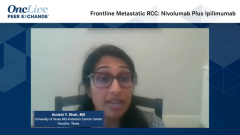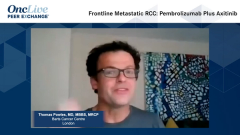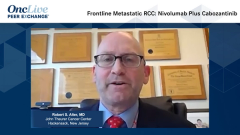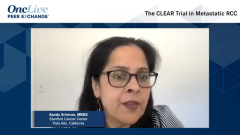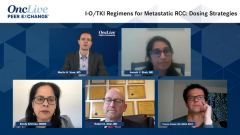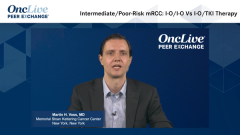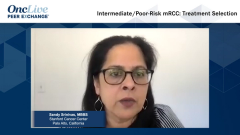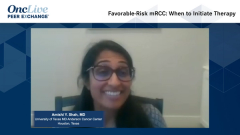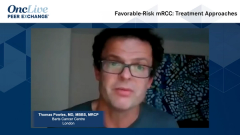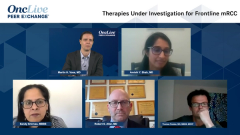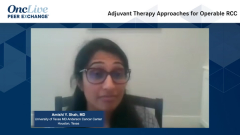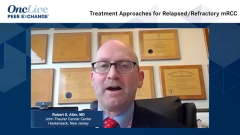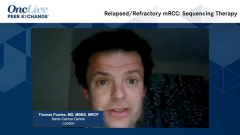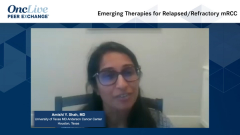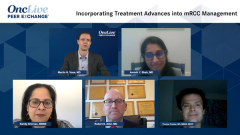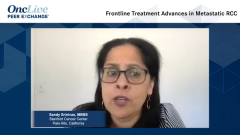
The CLEAR Trial in Metastatic RCC
Characteristics that distinguish the CLEAR trial of lenvatinib plus pembrolizumab as frontline therapy for metastatic renal cell carcinoma from other pivotal trials of immunotherapy plus tyrosine kinase inhibitors.
Episodes in this series

Martin H. Voss, MD: As we go through the historic highlights of what has happened since 2018 with these combinations, a relevant point to make is that the cabozantinib-nivolumab data reaffirmed the very strong signal we got with the other successful development of TKI [tyrosine kinase inhibitor]-I/O [immunotherapy], which was axitinib-pembrolizumab, as previously discussed by Dr Powles. It becomes very challenging to compare across trials, but anyone would agree that CheckMate 9ER was very relevant in that success of cabozantinib-nivolumab and reaffirmed the strategy of combining TKI and I/O therapy. There had been some data challenging that. The development of bevacizumab plus atezolizumab, as well as the phase 3 development of axitinib plus avelumab, had not succeeded in demonstrating superior overall survival [OS] in comparing to a single-agent TKI. These 2 studies very strongly brought home these points.
I also think it’s interesting that both of you highlighted the point of how hazard ratios and population-based outcomes change with median follow-up. It’s notable to say that both of these studies were reported with a very early efficacy signal. They were rightfully reported, but if a study is read out with 30-month median follow-up, it gives us pause to appreciate the longer-term effects that we’re all hoping to see with immuno-oncology drugs.
This leads us to a third relevant phase 3 study. That is the combination of lenvatinib-pembrolizumab, the new kid on the block, which is in its original report further down the line of follow-up. The CLEAR study was reported most recently. This is a combination that is not yet FDA-approved. I’m going to turn to Dr Srinivas to walk us through that data and give us an overview of that. I believe there were also some updates at this meeting in regard to the CLEAR trial.
Sandy Srinivas, MBBS: The CLEAR trial had a very similar design to all of the other trials that Tom talked about. The only difference here is it’s a 3-arm trial and brought lenvatinib. Its first appearance in RCC [renal cell carcinoma] came as a combination with everolimus in the second line, so this was an opportunity to test lenvatinib and everolimus in the first line as well. The CLEAR study was a large trial, randomizing lenvatinib and pembrolizumab with lenvatinib and everolimus, compared to the standard-of-care sunitinib, as has been described in other studies, with the same dose at 50 mg, 4 weeks on and 2 weeks off.
There are 2 things that are important to point out in this study. The starting dose of lenvatinib in the lenvatinib-pembrolizumab arm was 20 mg. It’s the highest dose we’ve ever seen of lenvatinib in any of our prior trials. The lenvatinib and everolimus had a starting dose of 18 mg. The primary end point of this trial was looking at progression-free survival [PFS] measured by independent review, per RECIST. It had the usual secondary end points of overall survival. Like you said, Martin, a readout came a little bit later. The median follow-up for this trial is close to 27 months, and the primary end point was reached. I think this is the highest PFS we have seen with any of our frontline combinations, with a PFS at 26 months and a hazard ratio that was close to 0.36. The OS data hazard ratio is 0.6 and has not been reached in the 2 arms. The response rate was the highest we have seen with any of the I/O-TKI combinations, with an overall response rate of more than 70%. Most impressive was the complete response at 16%.
If you talk about complete response, you have to talk about who came into the study. Certainly, there is a higher risk of favorable patients who came onto this trial. About a third of patients, 31%, were favorable risk. If you look at the 3 I/O-TKI combinations, this one probably had the highest fraction of patients with favorable risk. Nonetheless, it’s a pretty impressive overall response rate and the highest PFS we have seen. The hazard ratio for OS is pretty significant, and the best response for progressive disease, as Bob mentioned, for cabozantinib in CheckMate 9ER, was very similar. It was around 5%. They were all pretty impressive data.
The second arm, the lenvatinib and everolimus arm, was not significant in the OS compared to sunitinib, but it certainly makes lenvatinib and pembrolizumab a very competitive frontline TKI combination for patients with a metastatic RCC. This gained NCCN [National Comprehensive Cancer Network] approval for category 1 for all risk groups: favorable, intermediate, and poor risk. Some of the things that clearly need to be ironed out include the dosing of lenvatinib. If you dive a little deeper into the trial, you have to look at what the discontinuation rates are for lenvatinib and pembrolizumab. The starting dose of lenvatinib and how we adjust the dose is something we have to learn and adjust for adverse effects.
But overall, the top line is pretty impressive data. At the 2021 ASCO [American Society of Clinical Oncology annual meeting], Bob Motzer, MD, gave a quality of life presentation. Quality of life data get a little complicated and confusing, but the top line is that the quality of life was similar or improved compared to sunitinib. This trial meets all the top-line benchmarks that a trial can. It certainly has made it to one of our frontline choices when it gets FDA approved.
Transcript Edited for Clarity


